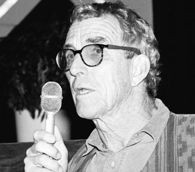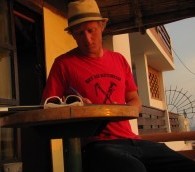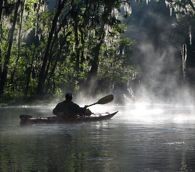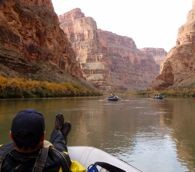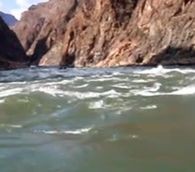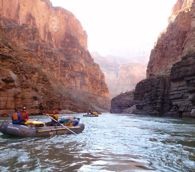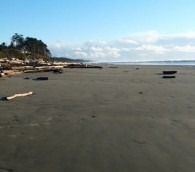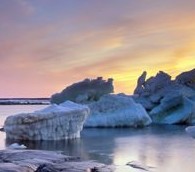Tag: Outdoors
Watch: The Official Trailer for ‘Wild’
by Jim Benning | 07.11.14 | 11:19 AM ET
The new film based on Cheryl Strayed’s bestselling memoir, “Wild,” doesn’t hit theaters until December, but the trailer was just released. The film stars Reese Witherspoon. It looks promising, doesn’t it?
By the way, the song featured here is Beck’s “Turn Away.” Great choice.
A few of our favorite related tweets:
@evaholland @worldhum Thanks for pointing that out, Eva. I adore World Hum.
— Cheryl Strayed (@CherylStrayed) June 5, 2012Here's first pic of me as Cheryl Strayed in WILD. So excited to play @cherylstrayed in a movie! http://t.co/t00BFeR5nX
— Reese Witherspoon (@RWitherspoon) October 18, 2013
Discovering Peter Matthiessen—and Myself
by Lynne Friedmann | 05.02.14 | 12:08 PM ET
Lynne Friedmann never thought she could make a life as a science writer. Then she read "Blue Meridian."
Interview with Arno Kopecky: Sailing the Northern Gateway
by Eva Holland | 04.08.14 | 10:58 AM ET
Arno Kopecky spent months sailing along a proposed oil tanker route off British Columbia. Eva Holland talks to him about the new travel book that resulted from the voyage.
Still Listening
by Catherine Buni | 07.13.12 | 10:28 AM ET
On New Hampshire's Androscoggin River, Catherine Buni tried to draw her paddling partners into conversation. But her questions only got her so far.
Cheryl Strayed’s ‘Wild’: Now Oprah-Approved
by Eva Holland | 06.04.12 | 12:31 PM ET
After being put on hold for two years, Oprah’s Book Club is back—and the first new pick is Cheryl Strayed’s hiking memoir, Wild. Here’s what Oprah had to say:
“I love this book. I want to shout it from the mountaintop. I want to shout it from the Web. In fact, I love this book so much and want to talk about it so much, I knew I had to reinvent my book club.”
This is the first time the club has focused on a travel narrative—it’s leaned heavily on modern fiction over the years—and it’s likely to make “Wild” the most popular travel memoir since “Eat, Pray, Love.” Here’s hoping the pick leads to more travel narratives making their way into the mainstream.
River a Mile Deep
by Michael Shapiro | 05.02.12 | 4:57 PM ET
Michael Shapiro rafts down the Colorado in the wake of Captain John Wesley Powell
River a Mile Deep: Three Videos
by Michael Shapiro | 05.02.12 | 4:54 PM ET
Videos from Michael Shapiro's 24-day rafting trip down the Colorado River
River a Mile Deep: Five Great Photos
by World Hum | 05.02.12 | 12:19 PM ET
Images from Michael Shapiro's 24-day rafting trip down the Colorado River
Everest Base Camp: Now With 3G
by Eva Holland | 04.28.12 | 11:40 PM ET
Outside’s Grayson Schaffer is spending two months blogging from base camp—and, as he notes in one of his early posts, he’s doing so without the use of a spendy satellite connection:
Until the 1970s and ‘80s, most Everest expeditions included two porters who did nothing but run mail dispatches from Base Camp to the nearest village. No longer. This year, multiple climbers at Base Camp are snapping photos on their iPhones and sharing them through Instagram and Facebook in real time.
That’s possible because of Nepal’s dominant cell phone service, Ncell. In 2010, the provider announced plans to bring 3G coverage all the way to Mount Everest. Now it’s here.
Just one more sign of our inexorably shrinking planet.
Jon Krakauer: Writing is like Rock Climbing
by Eva Holland | 04.26.12 | 9:51 AM ET
This week I’ve been making my way through a collection of interviews called The New New Journalism: Conversations with America’s Best Nonfiction Writers on Their Craft. It’s an interesting read. The writers—everyone from Gay Talese to Eric Schlosser and Susan Orlean—describe how they work, from story idea through interviewing to writing and editing.
In one section, Jon Krakauer explains his use of outlines. It involves a lot of hand-written scenes pinned to his office wall in sequence. The book’s author, Robert S. Boynton, asks him where he got the technique.
Here’s Krakauer’s reply:
Rock climbing. When you embark on a really big climb like, say, the Salathé wall of El Capitan, which rises three thousand vertical feet from the floor of Yosemite Valley, the enormity of the undertaking can be paralyzing. So a climber breaks down the ascent into rope-lengths, or pitches. If you can think of the climb as a series of twenty or thirty pitches, and focus on each of these pitches to the exclusion of all the scary pitches that still lie above, climbing El Cap suddenly isn’t such an intimidating prospect. By following an outline I can focus on the chapter that’s in front of me… It makes writing a book much less terrifying.
The Critics: ‘‘Wild’ by Cheryl Strayed
by Jim Benning | 04.05.12 | 10:39 AM ET
Strayed’s memoir about hiking the Pacific Crest Trail while reflecting on her life, including the death of her mother, is getting rave reviews.
This is a long way from Bill Bryson’s “A Walk in the Woods.” Apparently it’s no “Eat, Pray, Love,” either.
From Slate:
By laying bare a great unspoken truth of adulthood—that many things in life don’t turn out the way you want them to, and that you can and must live through them anyway—Wild feels real in ways that many books about “finding oneself,” including Eat, Pray, Love and all its imitators, do not. The hike, rewarding though it is, doesn’t heal Strayed. “I’d thought I’d weep tears of cathartic sorrow and restorative joy each day of my journey,” she writes. “Instead, I only moaned, and not because my heart ached. It was because my feet did and my back did and so did the still-open [pack] wounds around my hips.”
I’m a big fan of Brad Listi’s Other People podcasts, featuring wide-ranging, hour-long conversations with authors. He spoke with Strayed in February:
Dispatch from the Yukon Quest Trail
by Eva Holland | 02.07.12 | 3:57 PM ET
I’m on the road this week, doing some writing and social media work for the Yukon Quest.
For those unfamiliar with it, the Quest is a 1,000-mile sled dog race that runs from Fairbanks, Alaska, to Whitehorse, Yukon (my hometown). I’m following along, and on the trail with me is a traveling crowd of volunteers, veterinarians, race officials, “handlers” (assistants to the mushers), and friends and family. We drive from checkpoint to checkpoint, meeting up with the dog teams whenever they intersect with the sparse road system. I’m writing this from Central Corner, an outpost on the Steese Highway just south of the one-time Gold Rush town of Circle City.
Never seen a long-distance dog sled race? Here’s a video that gives you a real sense of the scene at the start line back in Fairbanks:
On Coastal Time
by Pam Mandel | 08.19.11 | 11:07 AM ET
Years pass. Life changes. But for Pam Mandel, one thing stays the same: her love for the Olympic Peninsula.
Travel Movie Watch: ‘The Loneliest Planet’
by Eva Holland | 08.17.11 | 7:01 AM ET
The Loneliest Planet premiered at the Locarno Film Festival last week. It’s an adaptation of a travel-themed short story, “Expensive Trips Nowhere,” by World Hum contributor Tom Bissell, and it stars Gael Garcia Bernal of “The Motorcycle Diaries” fame. The story follows a pair of young backpackers on a guided hiking expedition in the Caucasus Mountains, and judging from this Variety review, it’s a must-see:
Much of the pic’s first hour unspools through continuous handheld shots of the threesome trudging along with backpacks, telling stories when they’re not silently concentrating on navigating treacherous terrain. At regular interludes, long-distance shots observe them dwarfed by the landscape as Richard Skelton’s haunting, rhythmic, ethnically inflected score intones in the background.
An encounter on the trail turns into a near-life-threatening test of manhood that Alex [Bernal] arguably fails. Thereafter, none of the characters discuss what happened, but it casts a profound pall over the adventure, shifting allegiances and sympathies among the threesome. ...[V]iewers may recognize a core emotional truth about how deeply travel tests relationships, how a single instinctive action can shift the ground irrevocably between people, and how no words can make things right.
‘Any Bears Around Today?’
by Kim Mance | 12.30.10 | 12:35 PM ET
Kim Mance ventured into Canada's remote north looking for polar bears. She didn't anticipate becoming prey.
A Pilgrimage to Vailima
by Catherine Watson | 10.06.10 | 11:28 AM ET
An hour into her quest to visit Robert Louis Stevenson in Samoa, Catherine Watson ran out of water and lost the trail. What would persistence bring?
Free Admission This Saturday at all National Parks
by Eva Holland | 09.24.10 | 9:38 AM ET
The latest in a series of fee-free days falls this Saturday at all 392 U.S. national parks. Enjoy. (Via Arthur Frommer)
Dispatch From the Moscow Heat
by Michael Yessis | 08.06.10 | 11:23 AM ET
World Hum contributor Jeffrey Tayler recently returned from Paris to his Moscow home, where soaring temperatures and wildfires have crippled the city and other parts of the country. Tayler reports from the brutal—and alcohol-soaked—scene for the Atlantic:
Another Russian saying has it that, “Heat isn’t vodka, but we feel drunk from it all the same.” Which hasn’t stopped a good number of metaphorically heat-wasted Muscovites from turning literal and tippling their way through this interminable zharishcha. I walked outside this morning to find a gang of bare-chested fellows, with shaved heads, sweaty snouts, and stretchmarked potbellies, sitting on the guardrail near our doorway, guzzling beer and smoking, and for good measure, belching and swearing about the heat. Any walk around town reveals similar scenes: men have at times dispensed with much of their clothing, and carrying a beer (plus lit cigarette) is now de rigueur. This is legal: there’s no law banning open containers of alcohol in Russia. Except that in Russia, beer hardly qualifies as alcohol. (Unless possibly it’s that 12-proof brew marked krepkoye.) Beer is more like a training beverage. But vodka is considered alcohol, and thus possesses, many would point out, curative properties for whatever ails you. So fighting noxious heat with medicinal doses of vodka makes perfect sense. And I don’t mean some dainty cocktail, like, say, a vodka collins. The idea of mixing vodka with anything except more vodka is an abomination. Why dilute the healing fun?
Paddling the Alaskan Food Chain
by James Michael Dorsey | 07.19.10 | 11:45 AM ET
James Michael Dorsey was enjoying a quiet kayaking outing on Alaska's Inside Passage. Then he spotted a dorsal fin.
Tim Cahill: ‘Literate Outdoor Writing’ Isn’t Done Yet
by Eva Holland | 06.29.10 | 9:18 AM ET
In the San Jose Mercury News, World Hum contributor Peter Delevett interviews Tim Cahill about the origins of Outside magazine, risk and fear on assignment, and the state of outdoor writing in America today. Money quote:
Here was the main idea behind Outside: We were tasked to come up with an outdoor magazine, and three of us spent about six months reading every magazine there was. And they were all service-oriented: they’d tell you how to paddle a canoe the right way. Our concept was that there’s a great strain in American literature of outdoor writing, from James Fenimore Cooper through Herman Melville through Mark Twain through Hemingway and Faulkner, and that we could continue that strain of literate outdoor writing. And at first, in 1976, we were made fun of, because it was thought by a lot of the critics, “Literate people don’t go outdoors.”
Well, once again that great strain in literature has been subsumed, this time by technology. I think it always will come back; just in what form and how is the question.
Cahill’s “Road Fever” appeared in our list of the 100 Most Celebrated Travel Books of All Time. He also offered his thoughts on creating “literature adventure stories” in this video.
- « Prev Page
- Next Page »
